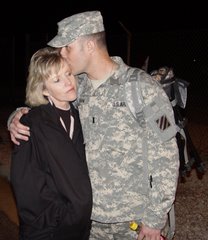
BY MICK WALSH - mwalsh@ledger-enquirer.com --
Perhaps as early as next week, the terminal at Lawson Army Airfield will be brimming with family members, friends, media, USO volunteers, the Infantry Center band and even a high-ranking garrison officer or two.
They will have come, no matter the hour or distance, to welcome home the soldiers of the 3rd Heavy Brigade Combat Team (one of President Bush's "surge" brigades) from 15 months of duty at posts in and around Baghdad, Iraq.
After the band plays and the soldiers are discharged to go home to more family and friends, the process of reintegration will continue on from its beginnings in Iraq. "We're training our soldiers on how to convert from a war front mentality to a home front mentality," said Capt. Anthony Randall Friday from an office at the Forward Operating Base Hammer.
"The process actually begins 60-90 days before we redeploy." Randall will be the only chaplain in the advance party of the brigade that will arrive at Lawson Airfield sometime next week. As Randall waits for the brigade in order to begin the reintegration process, other activities to help soldiers readjust will be going on, too. Other Chaplains will conduct a Spouses Retreat. This retreat is a three-day event for spouses and children of deployed soldiers, designed to help them prepare for the arrival of their loved ones.
Capt. Stephen Miller, the rear detachment commander for the 1st Battalion, 15th Infantry Regiment, is also a reintegration planner.
It is his job to keep the process going from the moment the planes touch down on the Lawson tarmac.
"They've been going through the pre-deployment checklist the last few weeks," said Miller, who has made two deployments to Iraq himself. "Yeah, I've seen it from both sides."
Miller will be part of the greeting party when the advance group arrives.
"After they check in their weapons and other sensitive items, we show them a video message from Lt. Gen. Rick Lynch, our division commander, one that really stresses soldier safety. For example, the soldiers can't drive a vehicle for the first 24 hours they're here and when they're given a 48-hour pass they can't travel more than 120 miles from post. The general takes the reintegration process seriously."
Once soldiers return from their initial break, they are required to attend 10 half-days of classes, covering such topics as domestic violence, anger management and suicide prevention.
"Every soldier in the brigade is required to go through this process," said Miller. "We start right off with how to communicate with spouses, how to recognize signs that could lead to suicide, drinking and driving... . We try to get them to understand the number of changes they've gone through during the deployment."
All personnel must complete the reintegration training before the unit is allowed to take a 30-day block leave.
Re-educating soldiers on family issues is a monumental task for Miller and his team, but he still feels his group can handle up to 600 soldiers a day.
There's also another aspect of the return of the troops that cannot be overlooked: work of the brigade's Family Readiness Group. The group's support assistant is Evelyn Livermore, and she insures that every arrival, whether it is 1 a.m. or 1 p.m., receives a proper "Welcome Home."
Single soldiers, who account for about half of the brigade, will be especially taken care of.
In past redeployments, those unattached soldiers were taken by bus to their barracks on Kelley Hill and dropped off. Some had to bed down in their sleeping bags.
But that has changed, said Livermore recently. Thanks to corporate donations, each soldier will have linens and personal items.
"BOSS (Better Opportunities for Single Soldiers) has 120 volunteers who will decorate the barracks and make beds, and Family Readiness will put out care packages," Livermore said
Miller states that even though a list of redeployment tasks has been required by the Army since the 2003 deployment to Iraq, the system of integrating soldiers back into society has become much more efficient with time.





No comments:
Post a Comment